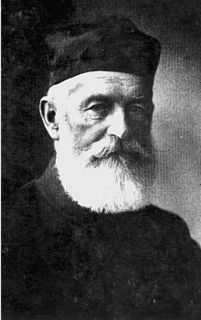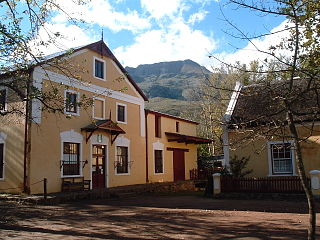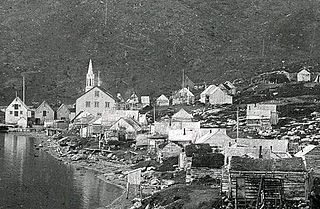This timeline of Christian missions chronicles the global expansion of Christianity through a listing of the most significant missionary outreach events.

Keta is a coastal town in the Volta Region of Ghana. It is the capital of the Keta Municipal District.
Limuru is a town in central Kenya. It is also the name of a parliamentary constituency and an administrative division. The population of the town, as of 2004, was about 4,800. In a census taken in 2019 the population had increased to 159,314.

The Cederberg mountains are located near Clanwilliam, approximately 300 km north of Cape Town, South Africa at about 32°30′S19°0′E. The mountain range is named after the endangered Clanwilliam cedar, which is a tree endemic to the area. The mountains are noted for dramatic rock formations and San rock art. The Cederberg Wilderness Area is administered by CapeNature.

Keetmanshoop is a city in the ǁKaras Region of southern Namibia, lying on the Trans-Namib Railway from Windhoek to Upington in South Africa. It is named after Johann Keetman, a German industrialist and benefactor of the city.

The Moravian Church, or the Moravian Brethren, formally the Unitas Fratrum, is one of the oldest Protestant denominations in Christianity, dating back to the Bohemian Reformation of the 15th century and the Unity of the Brethren founded in the Kingdom of Bohemia, sixty years before Luther's Reformation.

Tukuyu, known as Neu Langenburg during the German colonial rule, is a small hillside town that lies about 36 miles (58 km) south of the city of Mbeya, at an elevation of around 5,000 ft (1,500 m) in the highland Rungwe District of southern Tanzania, East Africa. Tukuyu town has a moderate to cool temperature ranging from 10° C in May/June to mid 20°C in around November. The town and surrounding areas are green all year round due to the almost year-round convectional rains resulting from Lake Nyasa(Lake Malawi).Tukuyu town is divided into several wards include; Kawetere, Msasani, Bulyaga and Bagamoyo.
The Rhenish Missionary Society was one of the largest Protestant missionary societies in Germany. Formed from smaller missions founded as far back as 1799, the Society was amalgamated on 23 September 1828, and its first missionaries were ordained and sent off to South Africa by the end of the year.

Carl Hugo Hahn (1818–1895) was a Baltic German missionary and linguist who worked in South Africa and South-West Africa for most of his life. Together with Franz Heinrich Kleinschmidt, he set up the first Rhenish mission station to the Herero people in Gross Barmen. Hahn is known for his scientific work on the Herero language.

Genadendal[χəˈnɑːdəndal] is a town in the Western Cape province of South Africa, built on the site of the oldest mission station in the country. It was originally known as Baviaanskloof, but was renamed Genadendal in 1806. Genadendal was the place of the first Teachers' Training College in South Africa, founded in 1838.

Crime in South Africa includes all violent and non-violent crimes that take place in the country of South Africa, or otherwise within its jurisdiction.

Okak is a former community located on Okak Bay in northern Labrador. It was founded in 1776 by Jens Haven, a missionary of the Moravian Church. In 1918, Moravian missionaries brought an outbreak of Spanish influenza that devastated Okak, killing 204 out of a population of 263.

Williston is a town in Northern Cape, South Africa. Town 103 km north-east of Calvinia and 140 km south-west of Carnarvon.
This article covers the period from the origin of the Moravian Church, as well as the related Hussite Church and Unity of the Brethren, in the early fourteenth century to the beginning of mission work in 1732. Further expanding the article, attention will also be paid to the early Moravian settlement at Bethlehem, Pennsylvania, following their first arrival in Nazareth, Pennsylvania in 1740.

Johann Fran(t)z Drège, commonly referred to by his standard botanical author abbreviation Drège, was a German horticulturalist, botanical collector and explorer of Huguenot descent.

Christianity in the 18th century is marked by the First Great Awakening in the Americas, along with the expansion of the Spanish and Portuguese empires around the world, which helped to spread Catholicism.

Albert Theo Fritz is a South African politician and advocate. He was the Western Cape Provincial Minister of Community Safety for two nonconconsecutive terms from 2010 to 2011 and again from 2019 until his dismissal from the position amid sexual misconduct allegations in 2022. He was a Member of the Western Cape Provincial Parliament from 2010 until his resignation from the DA in 2022. He served as the interim Leader of the Democratic Alliance (DA) in the Western Cape from the suspension and resignation of Bonginkosi Madikizela in April 2021 until his resignation from the party in March 2022. He was also the deputy DA provincial leader 2017 to 2021. Fritz previously served as the Western Cape Provincial Minister of Social Development from 2011 to 2019. From 2009 to 2010, he was a Member of the National Assembly and the Shadow Deputy Minister of Correctional Services.

Jamestown, also known as Webersvallei, is a quiet rural settlement on the southern outskirts of Stellenbosch in the Cape Winelands District of the Western Cape province of South Africa. It is situated next to Blaauwklippen Vineyards, on the eastern side of route R44 from Stellenbosch to Somerset West and the Strand coastal resort. The main access from the R44 is via Webersvallei Road, the main road in Jamestown with watererven – long, narrow agricultural plots on the south bank of Blouklip River – on the north side of the road and residential plots on the south side of the road.

The Greenmarket Square refugee sit-in was a sit-in protest by a group of refugees for the purpose of getting relocated to a country outside of South Africa in response to xenophobia in the country. It lasted from 8 October 2019 when protestors first occupide the Waldorf Arcade to 2 April 2020 when the last group of protestors were evicted from the Central Methodist Mission church. The protestors demanded that UNHCR assist them with being relocated to a third country outside of South Africa and other than their country of origin. At its height the protest grew to include about 624 protestors, including 65 undocumented refugees, according to a lawyer for the South African Department of Home Affairs.
The Ndifuna Ukwazi (NU), translated from isiXhosa: Dare to Know, is a South African non-profit advocacy organisation established in 2011 to advocate for affordable housing in well-located urban spaces. The organisation does this by conducting policy research, community organisation, public advocacy, litigation, and the provision of legal services. Most of the organisation's activities focus on communities within the City of Cape Town.



















